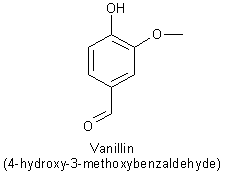Vanilla is a flavouring, in its pure form known as vanillin, derived from orchids in the genus Vanilla. The name came from the Spanish word "vainilla", diminutive form of "vaina" (meaning "sheath"), which is in turn derived from Latin "vagina".
Vanilla flavouring
Vanilla is a flavouring essence prepared from the seed-pods of Vanilla orchids. The species harvested for vanillin (there are in fact several) is mainly Vanilla planifolia. It is a native of Mexico, though now widely grown throughout the tropics. Madagascar is one of the largest producers. Additional sources include Vanilla pompona and Vanilla tahitiensis.
Chemistry
Though there are many compounds present in the extracts of vanilla, the compound predominantly responsible for the characteristic flavour and smell of vanilla is known as vanillin.
Vanilla essence comes in two forms: the actual extract of the seedpods, and the far cheaper synthetic essence, basically consisting of a solution of synthetic vanillin (4-hydroxy-3-methoxybenzaldehyde):

Natural vanilla is an extremely complicated mixture of several hundred different compounds, versus synthetic vanillin which is derived from phenol and is of high purity. However, it may be difficult to determine the difference between natural and synthetic vanilla flavouring.
Uses
Vanilla flavour in creams, cakes and other foodstuff may be achieved by adding some vanilla essence or by cooking vanilla beans in the liquid preparation. A stronger aroma may be attained if the beans are split in two; in this case, the innards of the beans, consisting of flavourful tiny black grains, are mixed into the preparation.
Good quality vanilla has a strong aromatic flavour, but foodstuffs with small amounts of low quality vanilla or artificial vanilla-like flavourings are far more common, since true vanilla is much more expensive.
One major use of vanilla is in flavouring ice cream: the most common flavour of ice cream is vanilla, and thus most people consider it to be the "default" flavour.
Since "plain vanilla" ice creams often do not have a strong vanilla taste, the term "French vanilla" is often used to designate preparations that actually have a strong vanilla aroma, and possibly contain vanilla grains.
History
Vanilla was a well regarded flavouring in Pre-Columbian Mesoamerica, and was brought back to Europe (and from there the rest of the world) by the Spanish Conquistadors.
In ancient Mexico the Totonac people were regarded as the producers of the best vanilla. They continued to be the world's chief producers of the flavouring through the mid 19th century. At that time, French Vanilla growers in Mexico traded their knowledge of artificial pollination of flowers for the Totonac knowledge of preparing the beans.
Some connoisseurs still regard the Totonac vanilla as the best. Such is sometimes marketed in gourmet food stores as "Mexican vanilla", although Mexico also produces low quality vanilla that sometimes shares this label.
The Coca-Cola Corporation is the world's largest customer of natural vanilla extract. When New Coke was introduced in 1985, the economy of Madagascar crashed, and only recovered after New Coke flopped. The reason was that New Coke uses vanillin, a less-expensive synthetic substitute, and purchases of vanilla more than halved during this period. By 2002, the company introduced Vanilla Coke which is Coca-Cola with vanilla flavour.
External links
- Electronic Plant Information Centre at Royal Botanic Gardens, Kew 2003-11-8 (http://www.kew.org/epic/index.htm)
